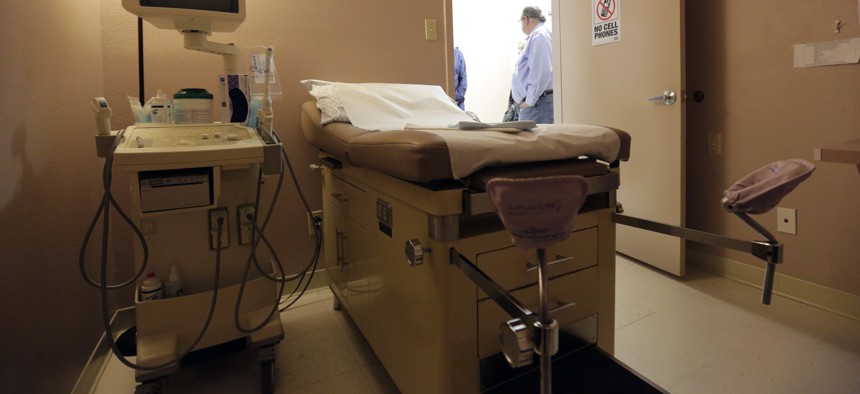Sixteen States Support Indiana's Push to License Abortion Clinics

A procedure room is seen during a tour and event at Whole Woman’s Health of San Antonio, Tuesday, Feb. 9, 2016, in San Antonio. Eric Gay/AP Photo

Connecting state and local government leaders
Advocates for the clinic said the licensing mandate was not about safety, but to prevent clinics from opening. The states argue that regulating medical facilities is commonplace and necessary to protect women’s health.
A coalition of 16 states are supporting Indiana’s bid to uphold licensing requirements for abortion clinics, asking the U.S. 7th Circuit Court of Appeals to overturn a ruling that allowed a clinic to open without a license.
The states, led by Texas Attorney General Ken Paxton, argue that Indiana’s licensing requirements are “eminently reasonable” and “in step with the licensing requirements of many other States, especially for applicants proposing to perform medical procedures.”
A federal judge ruled in May that the Whole Woman’s Health Alliance abortion clinic in South Bend, Indiana could open without a license, calling the state’s refusal to issue the clinic a license to operate a “substantial obstacle” for women.
U.S. District Court Judge Sarah Evans Barker wrote that not allowing the clinic to proceed was a burden on women in that part of the state.
“For women in northern Indiana who enjoy ample financial means, supportive personal relationships, and power over their own conditions of labor and movement, the scarcity of abortion access there likely presents an insubstantial burden,” she wrote. “But many women in these areas (as in most) do not enjoy those advantages, and lacking even one of them can cause substantial difficulties.”
The Indiana Attorney General’s office argued before the 7th Circuit this month that the appeals court should overturn the lower court’s injunction, which blocked the state from enforcing the licensing requirement before a 2020 trial.
Paxton, a Republican, filed a friend of the court brief this week supporting Indiana’s licensing requirements. Texas was joined by Alabama, Alaska, Arkansas, Idaho, Louisiana, Mississippi, Montana, Nebraska, Ohio, Oklahoma, South Carolina, South Dakota, Tennessee, Utah, and West Virginia in support of the case. At least 25 states require abortion clinics to be licensed, according to the court filing.
“U.S. Supreme Court precedents make clear that the states can require abortion facilities to obtain a license without running afoul of the Constitution, and our coalition is hopeful the 7th Circuit will toss out the lower court’s misguided ruling in the Indiana case,” Paxton said in a statement.
Whole Woman’s Health Alliance also operates clinics in Texas. Paxton’s court filing outlined a series of “health-and-safety deficiencies” documented at several of the non-profit organization’s Texas facilities to underscore the need for licensing requirements.
The South Bend facility began accepting patients in June. The Whole Woman’s Health Alliance has been trying to open a facility in the Indiana city for nearly two years. It only offers medication abortions, not surgeries.
The alliance first applied for a state license in October 2017. The Indiana Department of Health denied its license application in early 2018. State officials said they were not provided requested safety documentation and that the clinic was not of “reputable and responsible character.” A second review of the license application was also denied.
The clinic argued that the state’s requirements were arbitrary and vague.
The fight in Indiana comes as some states have passed numerous laws to restrict abortion, including focusing on stricter standards to regulate abortion clinics. Advocates say the regulations are politically motivated and aimed at limiting women’s’ access to abortions.
The Supreme Court last weighed in on an abortion case in 2016, when it overturned a Texas law that outlined several regulations for abortion clinics, including the requirement that abortion providers have admitting privileges at local hospitals. The court found that the restrictions violated the Constitution by placing an “undue burden” on abortion access.
The court’s decision in Whole Woman’s Health v. Hellerstedt “gave more power to clinics to self-regulate and put a heavier burden on states to justify health and safety regulations,” according to the National Review.
Since that case, anti-abortion state lawmakers have passed laws to end the practice, including outright bans that would allow for the criminal prosecution of either women who get abortions or the doctors who perform them. The goal of many lawmakers was to take the issue back up to the Supreme Court, which with the appointment of new Justice Brett Kavanaugh has a majority that they believe could be favorable to their side.
All of those laws will be challenged in court, but won’t make it to the Supreme Court for the upcoming fall session. Instead, the court could again take up the admitting privileges issue that was decided in the Texas case.
That’s because a 5th U.S. Circuit Court of Appeals panel last year upheld in a 2-1 decision a Louisiana law that was basically the same as the Texas law struck down by the Supreme Court in 2016. Earlier this year, the Supreme Court put the Louisiana law on hold, but has not decided whether to take the case. On Friday, Louisiana urged the court to allow the law to go into effect.
Andrea Noble is a staff correspondent for Route Fifty.

NEXT STORY: Immigrant Families Interrupt Daily Routines Due to Fear of Immigration Policies, Report Says




